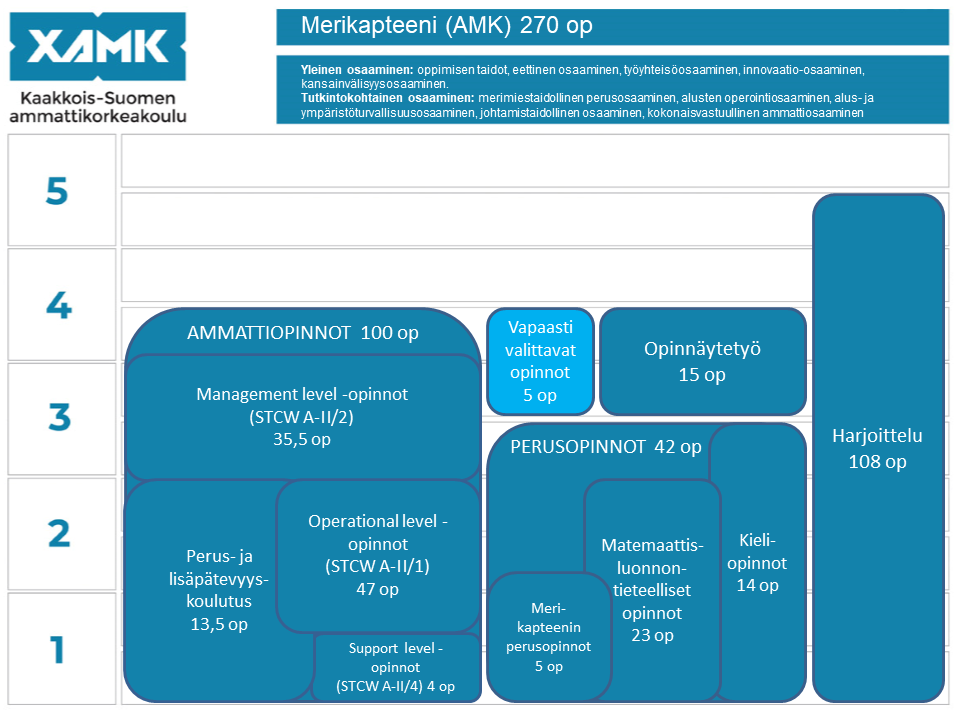Degree Programme in Marine Technology
- Degree
- Bachelor of Engineering
- Degree title
- merikapteeni (AMK), Bachelor of Marine Technology
- Credits
- 270 ects
Objectives
Merenkulkuala tarjoaa kiinnostavia ja haasteellisia tehtäviä sekä mahdollisuuden kansainväliselle uralle. Merikapteeni (AMK) -tutkinnon suoritettuasi sinulla on perusvalmiudet aluksen ohjaamiseen sekä käsittely- ja hallintamenetelmiin, ja osaamisen perustana ovat laitteistojen, lastioperaatioiden sekä navigoinnin ja meteorologian hallinta.
Koulutuksen ydintä ovat laiva- ja merikuljetustekniikka sekä kapteenitason merimies- ja johtamistaidot sekä turvallisuus- ja hätätilannevalmiudet.
Kieli- ja navigointitaidot sekä meriradioliikenne ovat olennainen osa merikapteenin työkalupakkia: alusten purkaminen ja lastaaminen sekä kansainvälinen kanssakäyminen ulkomaan satamissa ovat alan arkipäivää. Hyvää kielitaitoa edellyttävät myös monet merenkulkuun liittyvät säädökset, lastiasiakirjat, käyttöohjeet ja viestinnän hoitaminen.
Osa ammattiopinnoista toteutetaan englanninkielisenä.
Kaakkois-Suomen ammattikorkeakoulu (Xamk) tunnetaan säiliöalustoimintojen, meriympäristösuojelun ja alusten käyttötekniikan asiantuntijana. Xamkin merenkulun yksikkö on merenkulkuun, kuljetusosaamiseen ja alusten käyttötekniikkaan erikoistunut koko maata palveleva yksikkö
Degree programme description
Merikapteenin opintojen rakenne:
• perusopinnot
• ammattiopinnot
• vapaasti valittavat opinnot
• ohjattu harjoittelu
• opinnäytetyö
Monimuotototeutuksessa opintoja luetaan hyväksi aikaisemman työkokemuksen perusteella.
Opetus ja työharjoittelut kauppalaivoilla toteutetaan käytännön tehtävissä yhdessä alan ammattilaisten kanssa. Työharjoittelut on mahdollista suorittaa kansainvälisten väylien kauppalaivoilla.
Oppimisympäristöinä hyödynnetään
• modernia simulaattorikeskusta
• koulualus Katarinaa
• erilaisia yhteistyöprojekteja.
Koulutus jakautuu Support-, Operational- ja Management-tasoihin. Support-tasolla saat valmiudet toimia aluksen käytännön miehistötehtävissä. Operational-tason koulutus valmistaa sinut työskentelemään alemmissa päällystötehtävissä, ja Management-taso antaa teoreettiset valmiudet toimia kansainvälisen liikenteen ylimmissä päällystötehtävissä.
Ensimmäisenä lukuvuonna suoritat vahtimiehen pätevyyteen vaadittavat opinnot harjoitteluineen. Tämän jälkeen sinulla on mahdollisuus saada ensimmäinen pätevyyskirja, jolla voit vastaanottaa ensimmäiset työt laivalla puolimatruusina.
Vahtiperämiehen opinnot ja osa ohjatusta harjoittelusta suoritetaan kolmannen vuoden loppuun mennessä ja loput ylimmän tason opinnoista ja harjoittelusta seuraavan 1,5 vuoden aikana. Halutessasi voit täydentää koulutustasi tekniikan ja merenkulun muilla opinnoilla ja suorittamalla osan opinnoista vaihto-opiskelijana ulkomailla.
Viimeistään tutkinnon suoritettuasi sinulla on mahdollista saada vahtiperämiehen pätevyyskirja, jolloin voit toimia ensimmäisissä päällystötehtävissä laivoilla. Myöhemmin laivalla työskenneltyäsi sinulla on mahdollisuus saada yliperämiehen ja merikapteenin pätevyyskirjat.
Olennainen osa merikapteenin työtä ovat hyvät kieli- ja kommunikointitaidot, sillä kansainvälinen kanssakäyminen eri yhteyksissä kuuluu alan arkipäivään. Hyvää kielitaitoa, erityisesti hyvää englannin kielen taitoa edellyttävät myös monet merenkulkuun liittyvät säädökset, lastiasiakirjat, käyttöohjeet ja meriradioliikenteen hoitaminen.
Koulutukseen hyväksyttävän on osoitettava todistus terveydentilastaan.

Implementation of studies
Merikapteenin opinnot toteutetaan päivä- tai monimuoto-opintoina. Opinnot sisältävät teoriaopintoja, käytännön harjoituksia ja simulaattorissa suoritettavia harjoituksia. Tämän lisäksi opinnot sisältävät paljon käytännön harjoittelua laivalla.
Pääset toteuttamaan ja harjoittelemaan perusasioita koululaivalla, simulaattoriympäristössä ja harjoittelujaksoilla kauppa-aluksilla. Opetusta saat Kotkan kampuksella ja simulaattorikeskuksella, joka sijaitsee yhteistyökumppanimme tiloissa Kotkan Katariinassa. Opinnot sisältävät useita pitkiä harjoittelujaksoja kauppa-aluksilla. Ensimmäinen niistä on heti ensimmäisen vuoden keväällä. Yhteensä tutkinto sisältää harjoittelua 360 päivää.
Opintojen ohjaus
Xamkissa tuetaan opiskelijoita kaikissa opiskeluun liittyvissä asioissa. Opiskelusi tukena ovat opiskelijavastaavat ja opiskelijatutorit, jotka ohjaavat muun muassa opiskeluympäristöjä ja opiskelukäytäntöjä koskevissa asioissa. Käytettävissäsi kampuksilla on myös opiskelijapalveluneuvojan, opiskelijakuraattorin, opintopsykologin ja opiskeluterveydenhuollon palvelut.
BYOD – Bring Your Own Device
Xamkin opiskelijoilta edellytetään omien päätelaitteiden (esim. kannettavien tietokoneiden) käyttöä.
Career opportunities
Xamkin merikapteenin koulutus täyttää kansainvälisen STCW-sopimuksen vaatimukset ja antaa valmiudet alusten johtotehtäviin perämiehenä ja päällikkönä maailman meriliikenteessä sekä maaorganisaatioiden erilaisissa hallinto- ja koulutustehtävissä. Voit työllistyä eri alustyyppeihin, kuten erilaisiin rahti- tai matkustaja-aluksiin. Merimiehen valttina on kielitaito. Monipuolisia työuria tarjoavat laivapalvelun lisäksi merenkulun maaorganisaatiot, kuten hallinto-organisaatiot, varustamot, satamaoperaattorit ja telakat. Merenkulkijoita tarvitaan myös alan koulutustehtävissä.
Merikapteeni (AMK) -tutkinnon suorittaneen tehtävänimikkeitä voivat olla
• kapteeni
• päällikkö
• yliperämies
• perämies.
Merikapteenin koulutus tähtää merikapteenin tutkintoon ja koulutuksen aikana hankittavaan vahtiperämiehen pätevyyskirjaan. Koulutus täyttää kansainvälisen STCW-sopimuksen (Standards of Training, Certification, and Watchkeeping) vaatimukset. Pätevyystodistuksen saamisen edellytyksenä ovat STCW:n mukaiset hyväksytyt opinnot ammattikorkeakoulussa ja ohjattu laivaharjoittelu. Merenkulun koulutuksella on yleissopimuksen mukainen laatujärjestelmä.
Valtioneuvoston asetuksen mukaisesti vahtiperämiehen pätevyyskirjan saamisen edellytyksenä on muun muassa vähintään 18 vuoden ikä, säännösten mukainen koulutus ja siihen liittyvä työharjoittelu.
RDI and cooperation with world of work
Xamkissa kehität asiantuntijuuttasi aidoissa työelämäyhteyksissä. Erilaiset oppimisprojektit tehdään yhteistyössä opiskelijoiden, työelämän edustajien ja opettajien kanssa. Opintojesi aikana voit olla mukana monissa työelämäläheisissä oppimisprojekteissa, monesti myös usealle eri organisaatiolle. Tietosi, taitosi ja asenteesi kehittyvät sekä osaamisesi kasvaa, ja saat ensiarvoisen tärkeitä kontakteja ja yhteyksiä työelämään. Tutustut elinkeinoelämään, ja tiivis yhteistyö avaa sinulle näköalan alueen yrityksiin ja muihin sidosryhmiin jo opintojesi aikana.
Opetus ja työharjoittelut kauppalaivoilla toteutetaan käytännön tehtävissä yhdessä alan ammattilaisten kanssa. Oppimisympäristöinä hyödynnetään modernia simulaattorikeskusta, koulualus Katarinaa ja erilaisia yhteistyöprojekteja. Työharjoittelut on mahdollista suorittaa kansainvälisten väylien kauppalaivoilla.
Xamkin merenkulun yksikkö on merenkulkuun, kuljetusosaamiseen ja alusten käyttötekniikkaan erikoistunut koko maata palveleva yksikkö. Opetus toteutetaan kansainvälisessä toimintaympäristössä yhteistyössä alueen ja alan tutkimus- ja kehitysyhteisöjen, oppilaitosten sekä elinkeinoelämän kanssa. Opetusta järjestetään muun muassa yhteistyössä Kotka Maritime Centren kanssa.
Learning environments
Merikapteenin koulutuksessa hyödynnetään tehokkaasti erilaisia oppimisympäristöjä. Teoriaopintoja järjestetään perinteisissä luokkatiloissa. Käytännön harjoituksia tehdään esimerkiksi simulaattorikeskuksella navigointi- ja radiosimulaattoreita hyödyntäen. Tämän lisäksi harjoitellaan pelastautumisasioita altailla ja pelastautumisasemalla sekä palontorjunta-asioita yhteistyökumppanin simulaattoreilla ja aidoissa tilanteissa. Opintoihin kuuluvaa ohjattua harjoittelua suoritetaan koululaivalla ja erilaisilla kauppa-aluksilla maailmanlaajuisessa meriliikenteessä.
Master mariner, part-time studies
Timing plan:
Master mariner, part-time studies
Timing plan:
Master mariner, part-time studies
Timing plan:
Master mariner, part-time studies
Timing plan:
Master mariner, part-time studies
Timing plan:
